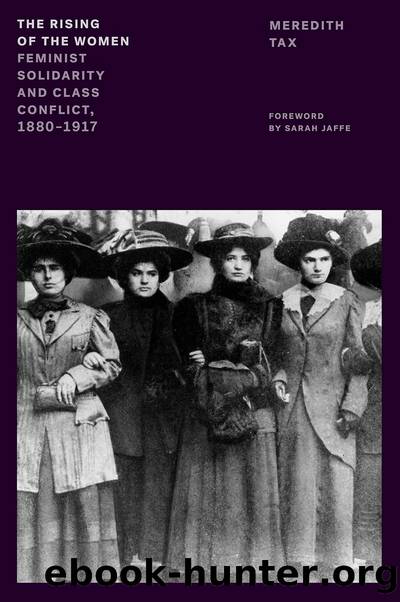The Rising of the Women: Feminist Solidarity and Class Conflict, 1880-1917 by Meredith Tax

Author:Meredith Tax [Tax, Meredith]
Language: eng
Format: epub
Tags: Social Science, Feminism & Feminist Theory, History, Women, Social History
ISBN: 9781839765742
Google: zuhOEAAAQBAJ
Publisher: Verso Books
Published: 2022-04-05T21:15:08+00:00
7
Socialists and Suffragists
We will not wait for the Social Revolution to bring us the freedom we should have won in the 19th century.
Crystal Eastman
âFeminismâ (1919)1
In the early years of the century the influence of U.S. socialistsâbroadly defined to include the anarchists and Wobblies at one end of the spectrum and the reform and Christian socialists on the otherâwas as great as it has ever been. These same years saw the development of a vast womenâs movement symbolized by and centered upon the struggle for the vote. Yet the socialist movement did not have much effect on the millions of women who mobilized for suffrage. Why?
Since Aileen Kraditor laid out a critique of the racism, class bias, and political opportunism of the suffrage movement fifteen years ago in her ground-breaking book The Ideas of the Woman Suffrage Movement 1890â1920, its conservatism has been well known. More recently, Ellen DuBois, in Feminism and Suffrage, has traced the origins of the movementâs conservatism to its relations with the abolitionists, trade unionists, and Republican and Democratic parties. But these early influences do not explain why the womenâs movement remained so conservative. It is true that it developed in the same period as the emergence of U.S. imperialism, and that it was increasingly under the leadership of women of the bourgeoisieâbut why was their leadership so little challenged? To understand this, we must turn directly to what might have been the left wing of the womenâs movement and see why it had so little influence on the character of the movement as a whole. The organizational weakness of the trade union suffragists, the IWWâs sectarianism towards the suffrage movement, and the Socialist Partyâs poor understanding of united front work offer some clues as to why the mainstream of the womenâs movement remained politically backward in a climate of general social upsurge, and why the radical feminists who eventually emerged as that movementâs left wing were so concentrated on the single issue of suffrage.
There is a tendency today to go to the other extreme and overlook the critical importance of the demand for woman suffrage, or to assume that the suffrage movementâs class base was so bourgeois that no radical influence was possible. In the hindsight of history, the suffragistsâ belief that the vote would bring not only full equality for women but also peace on earth seems a pitiful delusion. In fact, like other oppressed groups women could only learn the strengths and limitations of such rights through their own experience, and the most important consequence of the development of the womenâs movement was not the achievement of the franchise but the experience of building a movement itself. So Ellen DuBois points out:
It is certainly true that the Nineteenth Amendment did not emancipate women, and that rediscovering the revolutionary hopes that feminists had for the ballot has a bitter edge for us today. However, it is a mistake to conclude that the woman suffrage movement was a useless detour in womenâs struggle for liberation because the vote did not solve the problem of womenâs oppression.
Download
This site does not store any files on its server. We only index and link to content provided by other sites. Please contact the content providers to delete copyright contents if any and email us, we'll remove relevant links or contents immediately.
The Rules Do Not Apply by Ariel Levy(4969)
On the Front Line with the Women Who Fight Back by Stacey Dooley(4872)
The Lonely City by Olivia Laing(4801)
Bluets by Maggie Nelson(4556)
The Confidence Code by Katty Kay(4260)
Three Women by Lisa Taddeo(3433)
Not a Diet Book by James Smith(3425)
Inferior by Angela Saini(3313)
Confessions of a Video Vixen by Karrine Steffans(3308)
A Woman Makes a Plan by Maye Musk(3254)
Pledged by Alexandra Robbins(3177)
Wild Words from Wild Women by Stephens Autumn(3153)
Nice Girls Don't Get the Corner Office by Lois P. Frankel(3044)
Brave by Rose McGowan(2823)
Women & Power by Mary Beard(2767)
Why I Am Not a Feminist by Jessa Crispin(2760)
The Girl in the Spider's Web: A Lisbeth Salander novel, continuing Stieg Larsson's Millennium Series by Lagercrantz David(2721)
The Clitoral Truth: The Secret World at Your Fingertips by Rebecca Chalker(2720)
I Who Have Never Known Men by Jacqueline Harpman(2669)
